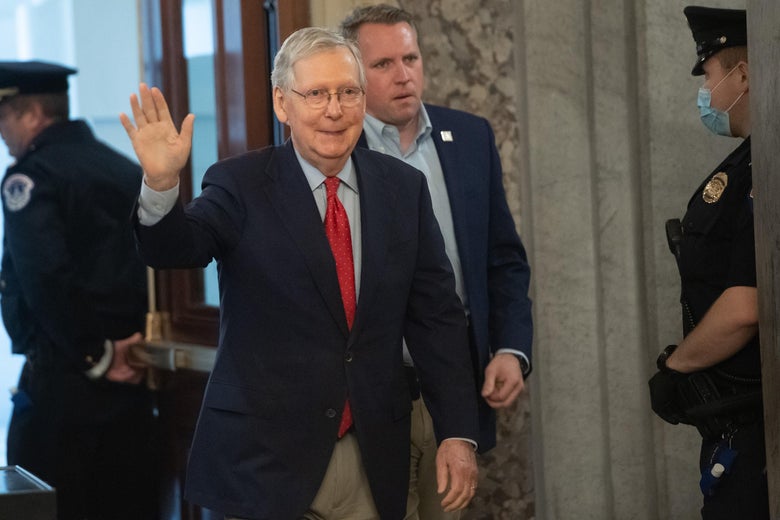
Mitch McConnell arrives for a pro forma session at the US Capitol in Washington, DC on April 21, 2020.
SAUL LOEB/Getty Images
The House and Senate will both reconvene as planned on May 4, leaders of both chambers said Monday, to consider new coronavirus relief measures. And as they do so, Senate Majority Leader Mitch McConnell warned, they should cast aside ideological ulterior motives and focus on immediate, crisis-related needs.
“The Senate must focus on concrete steps to strengthen our response to this complex crisis,” McConnell said in a statement. “We cannot get distracted by pre-existing partisan wish-lists or calls to paper over decades of reckless decisions that had nothing to do with COVID-19.” He added, for emphasis, that “the American people do not need tangential left-wing daydreams.”
The times are much too serious for legislative bodies to consider such tangential, left-wing preexisting wishes such as increasing food assistance during an economic crisis or improving states’ vote-by-mail infrastructure during a public health crisis. That’s why the two positions that McConnell has so far laid out are stripped of any ideology whatsoever: decimating blue-state governments and protecting employers against lawsuits.
McConnell has made known his hostility towards additional spending on state and local government assistance, the issue that Democrats intend to make the focal point of the next relief legislation. He speaks for much, though not all, of his conference. While the problem is straightforward—state and local governments, which are generally required to balance their budgets, are spending huge amounts of money to respond to the crisis and sustain the newly unemployed even as revenues have plummeted—he continually portrays the requests from states as them trying to cover for “decades of reckless decisions,” such as unfunded pension obligations. He has proposed, instead, allowing states to declare bankruptcy, a process through which state pensions could be restructured. It would have the added bonus of (further) destroying public sector unions. This is a significantly more ideological position than a call to increase maximum allowable SNAP benefits by 15 percent in a double-digit unemployment environment.
McConnell had first fleshed out his “let states go bankrupt” position in an interview last week with conservative radio host Hugh Hewitt. In another part of that interview, though, he and Hewitt gabbed about how important it would be to pass legislation shielding employers from COVID-related lawsuits. In his statement today, McConnell announced that such work would be a top legislative priority when the Senate returns.
“Here is just one example of an urgent need. While our nation is asking everyone from front-line healthcare professionals to essential small-business owners to major employers to adapt in new ways and keep serving, a massive tangle of federal and state laws could easily mean their heroic efforts are met with years of endless lawsuits,” McConnell said. “We cannot let that happen. Our nation is facing the worst pandemic in over a century and potentially the worst economic shock since the Great Depression. Our response must not be slowed, weakened, or exploited to set up the biggest trial lawyer bonanza in history.”
The coronavirus may be an unprecedented crisis, but this particular target has decades of precedent in right-wing policy-planning circles. McConnell had said to Hewitt that it would be difficult to pass legislation like that through the House, given that plaintiffs’ attorneys are generous donors to the Democratic Party. An extension of this cynical line of thinking, though, would suggest that McConnell has only prioritized this legislation because plaintiffs’ attorneys are generous donors to the Democratic Party.
He was right, one way or another, that House Democrats don’t share his desire for COVID-19-themed tort reform.
“The House has no interest in diminishing protections for employees and customers,” House Speaker Nancy Pelosi’s deputy chief of staff, Drew Hammill, said of McConnell’s pitch.
Look. Everyone is just setting a negotiating marker for the next phase of relief legislation, the process for which is going to be rockier than previous ones. Declaring opposition to something at this point doesn’t mean it is ruled out—even McConnell conceded on Monday that “there probably will be another state and local funding bill,” while saying he first wants to have his way with the lawyers. His insistence that it’s just Democrats trying to sneak “pre-existing partisan wish-lists” through a crisis, though, is projection.
Readers like you make our work possible. Help us continue to provide the reporting, commentary and criticism you won’t find anywhere else.
Join Slate Plusfrom Slate Magazine https://ift.tt/2yM71zy
via IFTTT
沒有留言:
張貼留言